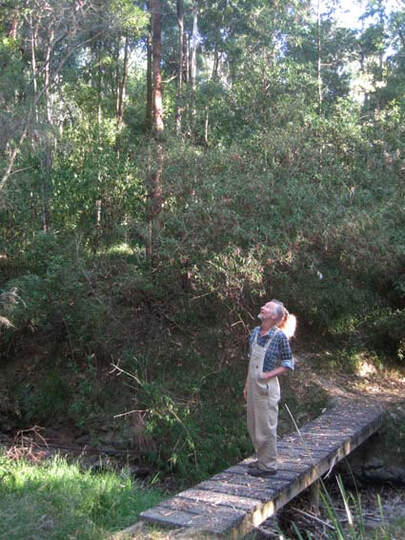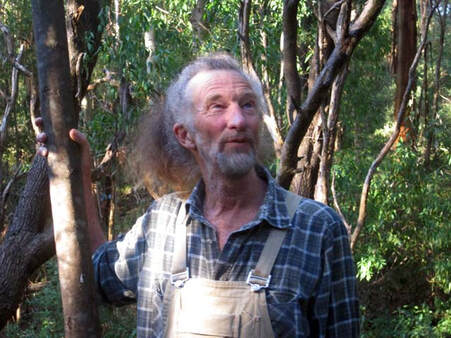 Paul Speirs: “I can’t save the world ... but I know I can
Paul Speirs: “I can’t save the world ... but I know I can make a difference locally."
YEARS ago it was a bare watercourse strangled by blackberry.
Today this stretch of creek in Glen Forbes is dynamic bushland. Beneath the blackwoods and eucalypts there’s an understorey of hazel, musk and prickly currant. And under those, ferns, moss and lichens. Fish swim in a spring-fed rock pool overhung with creepers. A Pandora vine is a nest for a ringtail possum. There’s even a Gondwana species, the Austral mulberry. The place is a roll call of lost plants.
This stretch of the west tributary of the west branch of Archies Creek is Paul Spiers’ backyard. It’s a riparian revegetation project he and the owners of several connecting properties have been working on for up to 20 years.
| Paul has been taking groups through his forest garden for more than 15 years. He urges people to be observant. During 23 years on the property, he’s seen half the plants die while thousands more have come back in their place. “I try to emphasise process,” he says. “It’s not just about revegetation. It’s always about what happens next, the mosses, lichens that follow.” He points out fallen trees. “I love the horizontal lines, the rotting logs ... you know that nature’s at work.” | Gill Heal's article was first published in the Post in 2014. This week Paul Speirs received Bass Coast’s environmental and sustainability award for 30 years of inspirational work transforming vast swathes of bush on and near his home in Archies Creek. |
“Why do echidnas matter?” he’ll ask. Because the next generation of plants depend on that ground being dug over. “And if we don’t know that, we won’t understand what the issues are, the dependence of all life on biodiversity.”

Talk of biodiversity leads Paul to his bete noir: blackberries. “I’m obsessed with killing blackberries and other woody weeds. Blackberries so mitigate against biodiversity; they occupy a whole area. Foxes the same.” It’s war.
He targets the coast, roadsides, “bits of land here and there”, spraying one year, following up the next. “I get rid of roadside weeds so I feel less anxious,” he says. Paul gives three or four months a year to serious spraying.
When they started the revegetation process, there was a lot of trial and error. None of the understorey plants were available at nurseries. “No-one was doing the wet gully revegetation.” Paul spent years collecting seeds and worked with an outstanding seed propagator. “We were asking the propagators to do something incredibly difficult: to produce a whole suite of plants from different seeds at the same time. And they did it.”
“I try to replicate nature,” he says, explaining why a planting of 80 per cent understorey, 20 per cent tree is more likely to be successful.
Everything he’s learnt over the years, from his own observations, from his work on the ground with Landcare, from his “formal” science-based training with Greening Australia, confirms the truth of this mantra.
Despite the slow creeping of green along Bass Coast’s waterways (Landcare puts in about 200,000 plants a year), they’re still working against a culture which sees the value of land in terms of one animal per acre. “In some ways,” Paul says, “the increasing number of city people buying acreages are more likely to see the value of protecting what’s there and reconstructing what’s been lost.”
Sociology and philosophy at university coloured his life and ethics. “Utilitarianism advocates the course of action which creates the greatest good for the greatest number. It’s a very old-fashioned idea. Me going out with a pack on my back and spraying blackberries is the best use of my time. I’m the only one who takes any notice.” (Having incurred the wrath of a Parks Victoria employee recently, he went out and sprayed where people really would notice: the cemetery, the tip, behind the hospital.)
What surprises him? The persistence of blackberries. But also the arrival of new species: the forest hounds tongue, the forest starwart. The riparian area gradually creeping uphill. The joy of that, that in less than half a lifetime, it’s turned into dynamic bush.
“When I was at uni, the two big issues were banning the bomb and limiting population growth and despite all our fuss we achieved nothing. Today we’ve got the bomb and a world population of over 7.5 billion!
“I can’t save the world by looking at the big picture. But I know I can make a difference locally. I’m a South Gippslander and my catchment is the Powlett. If everyone considered themselves citizens of their catchment we might be able to save the world.”